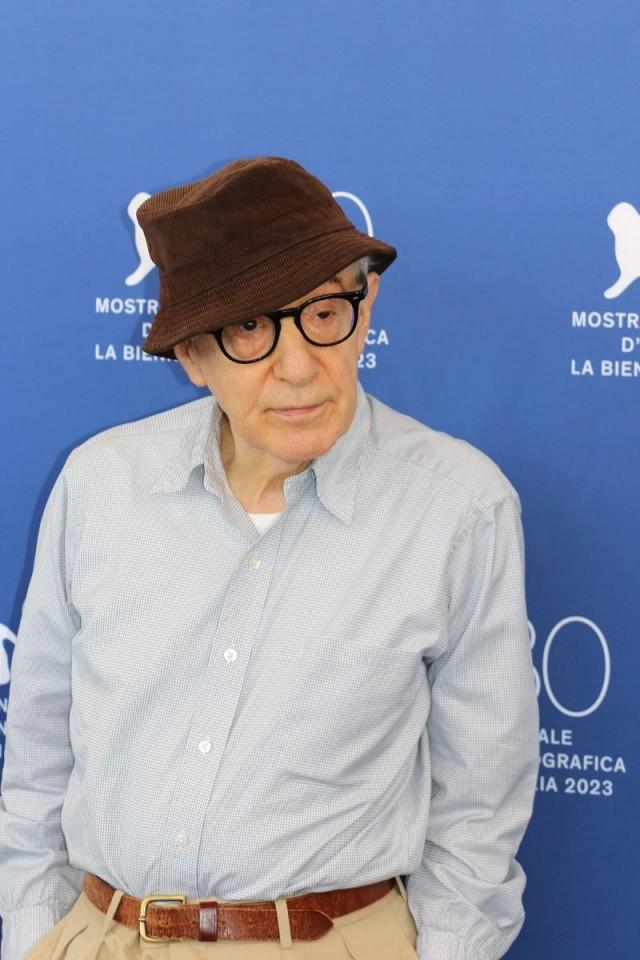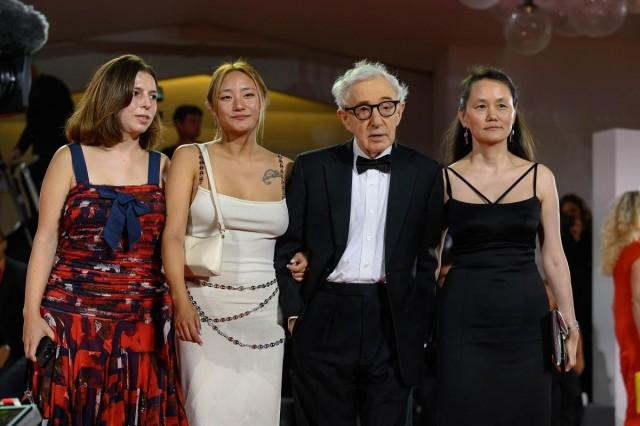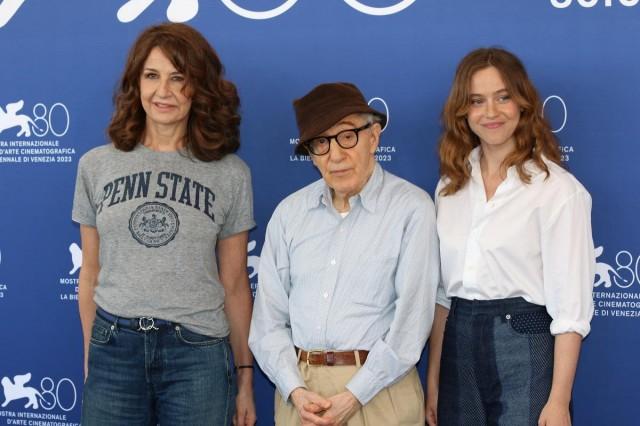Woody Allen talks about his 'Coup de Chance' film

"This is my 50th movie. It was a great privilege to have made it in Paris and it's a great honor to show it in Venice," revealed the 87-year-old award-winning filmmaker Woody Allen in a statement about his latest film, "Coup de Chance" ("Stroke of Luck") which premiered at the 80th Venice Film Festival.
The French drama thriller film tells the story of an ideal couple, Fanny (Lou de Laage) and Jean (Melvil Poupaud) who seem to have everything—fulfilled in their professional life, a magnificent apartment in the beautiful district of Paris and seemingly in love with each other.
However, everything changes when by chance, Fanny bumps into a former high school friend Alain (Niels Schneider) who used to have a big crush on her... and still does. Things get complicated when they see each other again... and again.
Allen, who got a three-minute standing ovation during the premiere of his film, got good reviews from critics on his latest feature film. The Guardian wrote, "Woody Allen's tale of ill-fated lovers is his best film in a decade."
Then from MetaCritic, they said, "Coup de Chance is not a major reinvention, but it does have more spirit and joie de vivre than anything Allen has done in a while. A sharp, lively cast shows that he is actually rather good at directing in French, and the stars seem accordingly to be having a good time in this light comedy that takes an unexpectedly dark turn."
However, NBC News reported, "Just outside the carpet a group of protesters walked by. According to social media posts, the protesters removed their shirts and handed out sheets of paper encouraging the fest to 'turn the spotlight off of rapists.'"
Allen has maintained his innocence regarding sexual abuse allegations from his adoptive daughter, Dylan Farrow.
The director talks more about his film "Coup de Chance," which played out of competition at the Lido, during the press conference held after the screening at the Venice Film Festival. Below are some excerpts.

You have worked in Paris before. What led you to decide to actually make a movie in French?
When I was younger, the films that were the most impressive to us when we were all starting out and wanting to be filmmakers were the European cinema, all the French films, the Italian films, Swedish films. We all wanted to be Europeans. We wanted to make films like Europeans. I've always tried that my whole life making films.
I was going to make this film with two Americans living in Paris. Then I thought to myself, well, it's my 50th film and I love Paris so much that I would make it in French. I don't speak French but that didn't bother me because all the actors spoke English. So, I thought I would make it completely in French, and I had a wonderful time making it.
I then felt that I was a genuine European filmmaker. I had seen all those films years ago by Truffaut, Godard, Resnais and Renoir, and so I wanted to join that group and make a film in French, and I did, and I had a lot of cooperation and help doing it.
It is said that luck is when preparation meets opportunity. So, in the seven decades that you have been creating, from comedy records to scripts to directing, and acting, when have you felt luck has stepped into your life? What is your own relationship to luck and opportunity?
I've been very, very lucky. I've been lucky my whole life really. I had two loving parents. I have good friends. I have a wonderful wife and marriage, two children. In a few months, I'll be 88 years old. I've never been in a hospital. I've never had anything terrible happen to me. I've been very, very lucky my whole life.
When I started making films, all the people chose to emphasize what I was able to do well and not hold me accountable for the things that I did poorly. They were very generous to me. I've been very lucky with my filmmaking and have had over my lifetime much undeserved praise and an enormous amount of attention and respect. So, I have nothing, but good fortune and I hope it holds out. Of course, it's early this afternoon, but so far, I've been very lucky.
Does this mean you will now make a film in Italian and one in German and maybe one in Spanish with the success of this? And do you see this as a semi-sequel perhaps to "Match Point" or to other films in your first 50?
It's in the genre of "Match Point" because both films revolve around the capriciousness of luck and chance having a much more dominant impact on our lives than we care to admit. So, both of those films say the same thing in different stories but, as far as filming in other countries, I don't know. It depends.
Sometimes I'll get a phone call from someone in a country, and they'll say, "We will finance your film if you make it in Icelandic," or some other language. And if I have an idea that's good for Italy or Germany or wherever, then I consider it. Sometimes I don't know the country well and I can't consider it, but I had such a nice experience working in France that it is something that I would certainly consider if I felt able to do it.

I would like to ask you about your leading male character. He's what we would describe today as a toxic man. I don't know if you agree with this depiction, and I would like to ask you about the roles you write for men. Do you write differently for men now than 20, or 30 years ago?
Well, 20 or 30 years ago, I was playing the parts that I wrote so I always wrote for myself, and I was always able to write better for women, more interesting parts for women. I don't know why. Maybe because the writers and the intellectuals who influenced me the most were Ingmar Bergman and Tennessee Williams, and these people wrote for women. And so, I wrote for women, I guess, out of their impact on me. I was never able to write for men particularly well with the exception of writing for myself. So, I don't know if that answers your question, but that's the way it broke down in reality.
You mentioned your admiration for Ingmar Bergman, and he has been dealing with the subject of death often, and you have been as well. And sometimes it seemed like last night, and here death comes up again. Is comedy or humor a possibility to fight against death, or could you elaborate on the idea of death?
I don't think there's anything you can do about it. It's a bad deal and you're stuck with it, and there's nothing much you can do. You can't really fight about it.
At the end of this movie, "Coup de Chance," we left on the screen the title, the under title, "Don't think about it too much." And all you can really do is not think about it too much because there's really no way out. There's no way out through science, through philosophy, through comedy. It's a bad deal and you just have to not think about it. That's the best you can do, distract yourself.
I want to ask you something about language. I was wondering since you are so much used to listening to English language in your films, if that was difficult for you while you were listening to the actors since you didn't understand them.
No, it was very simple because if you see a film, for example, if you watch a film, a Japanese film, you can tell if the acting is good, realistic, and natural, or if it's dramatic and silly or too exaggerated. The same thing here.
I could tell by the body language and the emotion of the actors, without understanding the language, when they were being realistic and when they weren't. If I ever didn't, and I wrote the words, but if they were making up their own words, which is fine, and they did whenever they felt like, I could understand the gist of it.
If I couldn't, I would turn to the lady next to me, my assistant, and ask a question and she would explain it to me. So, the cast read the scenario and they understood it. It was so much out of my hands. They understood the whole thing. They're first-rate actors and actresses. They did it. I didn't have to really direct them much. The few times I had to say something, they spoke in English. Vittorio always makes me look like a hero. So, for me, it was not difficult to do it in French.

Can you talk a little bit about how your screenwriting habits changed over the years? Do you still dedicate the same amount of time to writing each day? Do you find yourself to be more confident as a writer than you were at the beginning of your career?
There are a few things you learn and that's the end of it. Then every situation is very different. You learn a few little things from experience in trying not to be boring, which is the big trap.
I write the same way. I get up in the morning, do my exercise, have breakfast, lay down on my bed with my pen and pad, and write. Then when I'm finished, I type it up on my typewriter.
I've always done that, and I do it now. As I say, when you first start, there are a couple of things you learn in the first few films that are egregious. Then after you've learned that you don't learn anything else. The rest is up to you, and it depends on your inspiration.
You mentioned this film was supposed to initially star an American couple in Paris, and I wonder what adjustments were made to the script before being able to make the film in French. Did the film have a different title or was it always called "Coup de Chance"? And, secondly, it's wonderful to see you making films in Europe, but is there any chance we'll have a film of yours in New York again anytime soon?
The only changes I had to make were cosmetic. When I was first going to do the film, "Match Point," I wrote it for the United States, and then somebody in England called me and said, "We'll back your film." And suddenly I had to make it British.
These are all cosmetic changes. So, I had to make, instead of an American job or Americans working in Paris, I had to switch to somebody who lived in Paris and worked there. But these are all trivial changes and simple.
Oh yes, I've got a very good idea for New York. If some guy steps out of the shadows and says, "We'll finance your film in New York," and obeying all my terrible strictures, they can't read the script, they can't know who's in it. They just have to give me the money and go away. If some foolish person agrees to that, then I will make the film in New York.
—MGP, GMA Integrated News




